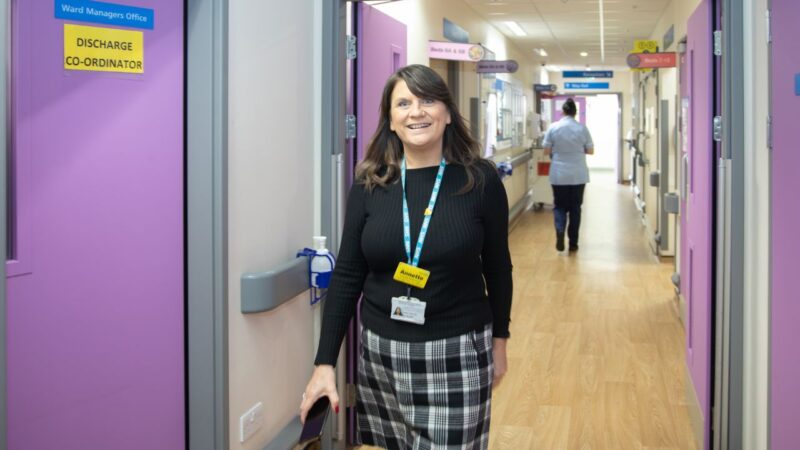Annette Hitchmough is the discharge coordinator on the Mary Moore Ward at St Helier hospital. With services under high pressure, she plays a vital role in ensuring people go home as soon as it’s safe for them to do so, keeping the flow of patients moving through the hospital.
Annette is South west London-born and bred and lives in Sutton, close to her large family. Organised, approachable and with all the right contacts, Annette is at the end of a phone for family members struggling with a patient in hospital.
This interview is part of a series, going behind the scenes to get to know the people who keep NHS services working – in winter and beyond.
What does a discharge coordinator do?
No two days are the same. I always tell new nurses on the ward that there are two types of discharges – straightforward ones, for example the 18-year-old who comes in, has their appendix out and is good to go. Then there are patients who have been struggling at home, and maybe had a fall. They might not have a care package, but it becomes apparent they will need one, so that means liaising with families, with social care, to get them home or maybe a new nursing home placement. My job is all about safe discharges. And the flow of patients from the emergency department to the ward.
What sort of cases do you have?
My ward is a large, 39-bed acute surgical ward. Patients come here via the emergency department or sometimes their GP. Though this is a surgical ward, we can have patients with fractures, head injuries, people who need intravenous antibiotics for infections, or are stepping down from intensive care. In winter we might have six or seven hip fractures for example. You never know who will come in.
Tell us about a typical day?
After the doctors have done their ward rounds in the morning, I look at which patients are coming up to being medically fit to go home. I’m constantly looking ahead. At 11am we have a meeting with nurses and therapists. We go through all 39 patients, looking at potential discharges. After that it’s calling nursing homes, liaising with families, chasing medication, getting transport sorted, sending off referrals for social care. It’s a constant process and one phone call can change the course of my day. Say there’s a patient who’s waited two weeks for a nursing home, I might get a call at 2pm to say there’s a bed.
How did you get here?
I left school with a handful of O levels, no sixth form, no university. I’m local, born in St George’s, and my first job was an admin role in Wimbledon at 16. I was a GP receptionist for five years. I then worked at the Royal Marsden for 10 years, organising clinics, before joining St Helier. I worked in the acute medical unit as a doctors’ administrator, followed by a brief spell managing rotas, before I became a discharge coordinator and eventually was offered the position on Mary Moore Ward. On my way I’ve picked up a lot of knowledge and contacts, an understanding of how things work.
Is there a person whose story highlights why your role matters?
There are hundreds. People come in with their husbands, wives, parents, often at their wits end. They aren’t coping at home, the person may have had numerous falls, sometimes they’ve got dementia. People don’t realise that there is support out there. They come in and meet someone like me. I talk them through the help that’s available and make sure I’m there for them. You make a difference every day with just a kind word. That’s why I do the job.
Why is your work important to managing winter pressures?
We had 10 discharges from this ward alone yesterday, that really is helping keep the hospital afloat. But it’s not all about numbers, it’s also about people. Patients don’t always want to go home, and it can be really hard. I can look at an older lady who is warm and comfortable on the ward, but there might be another 90-year-old on a stretcher sitting in the emergency department, who needs that bed.
What do you get up to when you’re not managing discharges?
My sons say, ‘you don’t do anything Mum, you’re really boring’. I could lie and say I’m a fluent Spanish speaker or a trapeze artist, but I’m not. I am a very social person, I’ve got a lovely big family – three grown up sons, I’m close to my sister and her family, and we all get on. I’ve always got something planned.
Tell us something we might not know about you?
I had major surgery last year. I’ve been back at work since January. It was the surgeons here that operated on me. This ward is my safety net. If I’m anxious or worried the doctors know what I went through. My own health issue helps me empathise with the patients and, if relevant, I do share my experience with them and their family.
